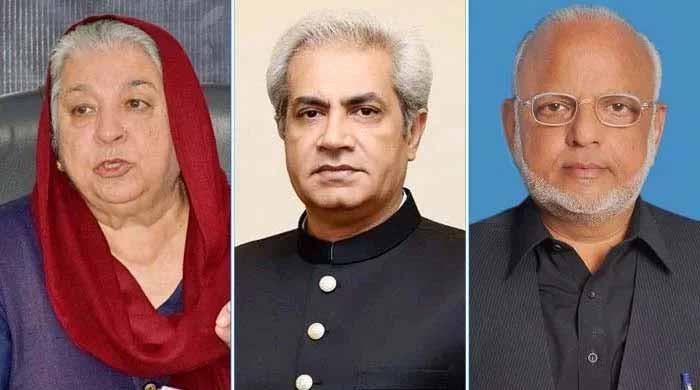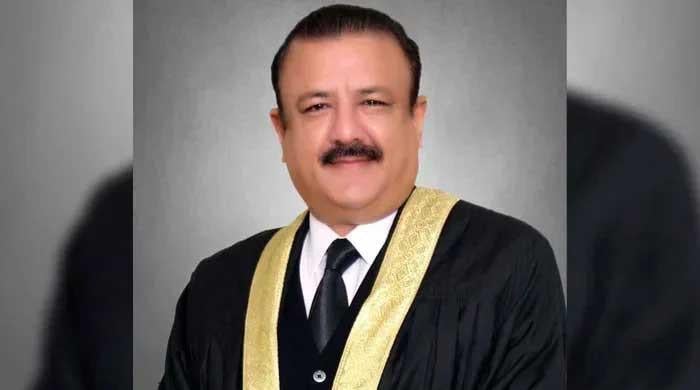Justice Qazi Faez Isa case: Govt says satisfied with Supreme Court’s decision
SAPM Shahzad Akbar says as of now, there are plans to file a petition against the verdict in the Justice Qazi Faez Isa case
June 20, 2020

ISLAMABAD: Special Assistant to the Prime Minister on Accountability Shahzad Akbar has said the government is satisfied and has accepted the decision given by the Supreme Court in response to several petitions dealing with the presidential reference against Justice Qazi Faez Isa.
Addressing a news conference after a full-court bench quashed the presidential reference, Shahzad called the decision "a good decision" and described it as "neither anyone's victory nor defeat".
He said that, as of now, there is no plan to file a petition against the verdict.
Akbar said that the Pakistan Tehreek-e-Insaf (PTI), its chairman and he himself, as an advocate, had great respect for the superior judiciary and respected its independence.
He said the PTI believed in the separation of the judiciary, the executive and Parliament, as was envisaged in the Constitution of Pakistan. He highlighted that under Article 209, there were three ways a reference can be filed against a judge.
The first is that the Supreme Judicial Council (SJC) takes notice by itself against a judge. Secondly, if the government files a reference with the SJC, and thirdly, if any person approaches the council for action.
Read also: SC dismisses presidential reference against Justice Qazi Faez Isa
Akbar noted that the proceedings on the petitions against the presidential reference filed under Article 209 of the Constitution continued for 13 months.
“There is a mechanism for the accountability of every institution and the superior judiciary is only answerable to the Supreme Judicial Council, comprising five senior-most judges of the superior judiciary,” he said.
Akbar further said that the reference was about three flats owned by the wife and children of the honourable judge, which had been challenged by the petitioner. He noted that as per the short order, the judges of the bench declared the proceedings of the Supreme Judicial Council and its show-cause notice as abated.
As per the SC verdict, within seven days, the inland revenue commissioner of the Federal Bureau of Revenue (FBR) will issue notices to the spouse and children of the honourable SC judge who are owners of flats.
Within 75 days, the commissioner will furnish a report in the light of documents, money trail and other material and, if there are further questions and answers, more documents can be sought.
The commissioner will then send, within seven days, the report to the FBR chairman, who will be bound to send it to the SJC chairman with his signatures.
The chairman will then place the report before the Supreme Judicial Council under the rules defined as per Article 209 of the Constitution and it will hold deliberations for perusal, consideration, action or order or proceedings if any, he noted.
Akbar said it was written also that the FBR proceedings will have nothing do with the council's proceedings based on the report and the council will decide on whether or not to take further action in this scheme of things.
Akbar said the government was satisfied with the judgment and it was a good judgment.
He said the dispatch of the government's reference to the Supreme Judicial Council had not at all meant that the government was looking for a particular decision, as its duty as per the Constitution was to refer information and the honourable judges had to then see it and attend to the matter, which has nothing to do with the government.
He said the scheme of things set as per the order was quite proper and whatever would be the next decision, the government's duty was over already, as now the matter was between the SJC and the judge concerned.
Akbar added that the government lawyers were quite mindful of not saying anything which might lead to creating any controversy.
“We did what was our constitutional right and then the honourable judges had to hold proceedings and they are extremely respectable to us. However, as soon as the short order came, an environment was created, as if it was someone’s victory and someone’s defeat. In democratic societies and constitutional schemes, giving such colour to a judgment is not proper,” he maintained.
The SAPM said he had gone through the order repeatedly but he could not find the name of Asset Recovery Unit or its abbreviation in it or that it had been declared illegal. He said the detailed judgment would also be a guide to the government and serve as a beacon light in the future.
He added the prime minister had no problem with the matter being referred to the FBR when a timeline had also been given on this count.
Originally published in The News









